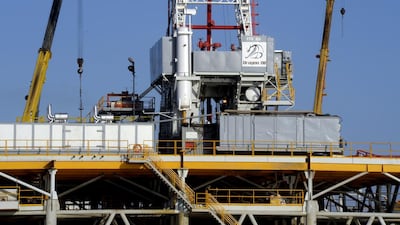This week we take a look at Dubai property predictions, market meltdowns, divorce in the Emirates, the battle for Dragon Oil shares and the new insolvency law.
Dubai property pendulum keeps swinging
Dubai's property market is closely watched, both as a bellwether for economists and a scorecard for owners. This week, two views of the market emerged: one, prices are going to keep slipping; two, prices are as likely to rise as to fall. Early this week, we reported that market analysts expected the market's price decline to continue until at least the first quarter of 2016. The problem is one of continuing oversupply – though the market could self-correct to some extent if lower prices cause developers to delay projects. A slightly more optimistic view of the market came in a survey of 200-plus executives by London Business School. Fifty per cent of respondents said they expected Dubai property prices to rise; 47 per cent said they expected prices to fall. So, which way is it going to go? Rob McKenzie
Market mayhem goes global
Market meltdown has filled the headlines across the world this week, as Greece edged yet another step closer to exiting the euro, and, more worryingly according to some financial commentators, China's stock market plunged this week amid "panic" according to the nation's securities regulator. But sliding underneath all of this Greek drama and alarm looking East, has been the descent of the price of oil which has snaked its way well below $60 again. As of Wednesday it was at a three-month low with one analyst saying that prices were "getting hit from all angles". The expectation was for a recovery in the price during the second half of the year, but certainly in the near term this looks unlikely. "It will persist for at least the next two weeks until we see a visible return of confidence in China's financial markets," said Gordon Kwan, the Hong Kong-based head of regional oil and gas research at Nomura Holdings. A nuclear deal for Iran, which is reportedly close, is set to add a further stumbling block in the road towards $100 oil again, though all eyes, for now, will remain on Greece and China. Ian Oxborrow
Prevent divorce from getting messy
It's not a subject any happily married couple wants to discuss but our special coverage on divorce in the Money section was well received this week. It's aim was not to inspire warring couples to instantly book a lawyer and head to the courts but to inform those that had made the difficult decision to split of the right way to go about it. Divorce is a tricky affair for any couple but for expats of different nationalities, and sometimes, different religions, it becomes even more complicated. And not being up to speed on your rights and your financial entitlement can be costly. The key piece of advice is to decide which jurisdiction you want to carry out the process - in your home nation or here via the UAE courts. Different jurisdictions can have very different outcomes – particularly if you are a woman – something that can have a long-term effect on the finances of each party. And because divorce can be a very messy business, it's wise to do some solid research before you begin to ensure you secure the best possible outcome for your family, your finances and your future. Alice Haine
Battle for the Dragon goes on
It makes sense that a battle over a dragon would drag on. And that there would be some chest-beating and fire-breathing. The dragon in this case is Dragon Oil, the London-listed, Dubai-based operator whose main assets are oil and gasfields off the Caspian coast of Turkmenistan (also noteworthy: the company logo is a D shaped like a dragon). Emirates National Oil Company, or Enoc, owns 54 per cent of Dragon's shares. Last week it offered to buy the rest for 750 pence a pop. The investors who own those shares would, naturally, like more pence. Fund companies that own about 10 per cent of the total shares have come out against Enoc's bid; in contrast, fund companies that own about 2 per cent of the shares have come out in favour. Enoc took an initial run at Dragon's minority investors six years ago, but they didn't bite. Back then the bid was for 455 pence a share. Rob McKenzie
Deep digging reveals bankruptcy law
"The Cabinet reviewed other topics on the agenda and approved the issuing of a law on financial regulation and bankruptcy." Such words, buried deep in the press release of Sunday's cabinet meeting, were missed by almost everyone. However it's hard to overstate their importance: after several years of false starts and hard work, the UAE's insolvency law is significantly closer to becoming a reality.
The new law, which draws on insolvency legislation from France, Germany, the Netherlands and several other countries, has to now be submitted to the FNC for approval, before being referred to the leaders of the seven emirates, and finally to the UAE president before becoming law. Such a process is unlikely to be swift. However, cabinet approval means the much needed new law is ever closer to finally becoming a reality. John Everington
business@thenational.ae
Follow The National's Business section on Twitter





